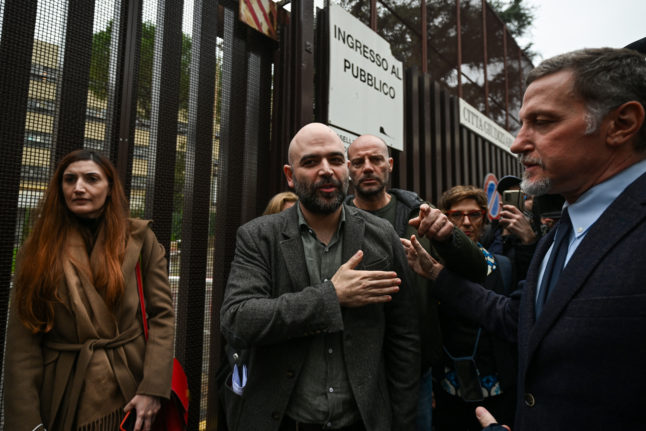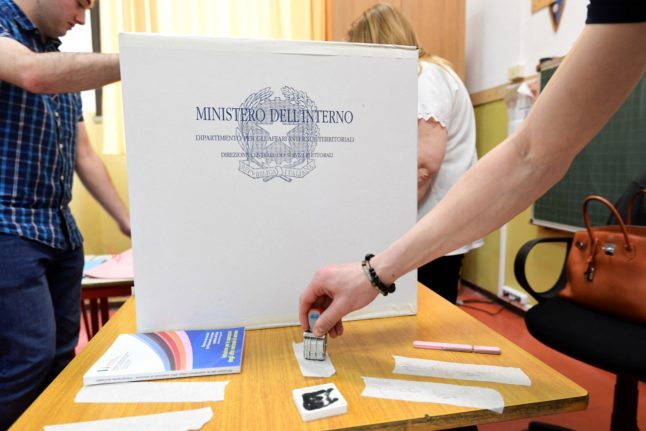Meloni sued over comments Saviano made criticising her stance on migration and the charity ships that rescue migrants making the perilous journey across the Mediterranean from North Africa.
It went to trial in November 2022, just weeks after she took office at the head of a hard-right coalition elected in part on a promise to end mass migration into Italy.
“I am being prosecuted for the words I used to criticise the populist lies uttered against NGOs and migrants in recent years,” Saviano wrote on Thursday on X, formerly known as Twitter.
READ ALSO: Press freedom fears as Italian PM Meloni takes Saviano to trial
Saviano, best known for his international mafia bestseller “Gomorrah”, risks up to three years in prison if found guilty, although any decision on Thursday is open to appeal.
He is supported by press freedom groups, who have said the case sends a “chilling message” to journalists.
“The judge will have to establish whether or not it is possible to exercise the right of criticism” in Italy, Saviano wrote on social media on October 3rd.
His lawyer, Antonio Nobile, told AFP on Wednesday the case “is important from a point of view of the health of Italian democracy”.
The conviction of a high-profile figure such as Saviano “would have a very strong deterrent effect on ordinary people”, he added. The hearing in Rome is due to start at 2pm.
Migrant shipwreck
The case revolves around comments Saviano made on a political TV chat show following the death of a six-month-old baby from Guinea in a shipwreck.
The baby, Joseph, had been one of 111 migrants rescued by the Open Arms charity ship, but died before he could receive medical attention.
READ ALSO: What’s behind Italy’s soaring number of migrant arrivals?
In footage shot by rescuers and shown to Saviano on the show, the baby’s mother can be heard weeping “Where’s my baby? Help, I lose my baby!”
A visibly emotional Saviano then blasted Meloni and Matteo Salvini – the leader of the anti-immigrant League party, now her deputy prime minister – who have both long used anti-migrant rhetoric.
“I just want to say to Meloni, and Salvini, you bastards! How could you?” Saviano said on the show.
READ ALSO: Italy investigates Placebo frontman over calling Giorgia Meloni ‘fascist’
The year before, Meloni had said charity vessels which rescue migrants “should be sunk”, while Salvini, as interior minister that same year, blocked rescue ships from docking in Italian ports.
In October 2022, Meloni took office on a promise to end illegal landings on Italy’s shores – only to see numbers surge.
Criticism of judges
Saviano, who lives under police protection due to threats from the Naples “Camorra” mafia, has decried an unequal fight between him and the country’s top politician.
Meloni’s lawyers have argued that, in suing Saviano, she is defending her reputation after being “insulted” on national television.
The verdict comes against a backdrop of increased tensions between Meloni’s government and the judiciary.
She led personal criticism earlier this month levelled at a judge who ruled her cabinet’s new anti-migrant decree was unconstitutional and contrary to European law.
“The controversies of recent weeks have certainly not reassured us,” Saviano’s lawyer said.
READ ALSO: Six things to know about the state of press freedom in Italy
Deputy Prime Minister Salvini has joined Meloni’s case as a civil party seeking damages.
He has filed a separate defamation suit against Saviano for calling him the “minister of the criminal underworld” in a social media post in 2018.
The next hearing is due on December 7th, when Salvini is set to give testimony, Nobile said.
Defamation through the media can be punished in Italy with prison sentences from six months to three years.
But Italy’s Constitutional Court urged lawmakers in 2020 and 2021 to rewrite the legislation, saying jail time for such cases was unconstitutional and should only be resorted to in cases of “exceptional severity”.
Italy has long compared poorly to its European neighbours for press freedom. It ranked 41st in the 2023 world press freedom index published by Reporters Without Borders, up from 58th in 2022.



 Please whitelist us to continue reading.
Please whitelist us to continue reading.
Member comments